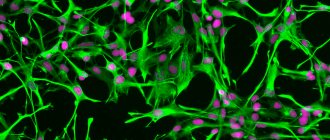Causes of alcoholic dementia
The cause of the disease is prolonged alcohol intoxication. Ethanol and its metabolite, acetaldehyde, a group 1 carcinogen, have a negative effect on the body. As a result of the penetration of toxic substances through the blood-brain barrier, brain neurons die. The process is repeated every time you drink strong drinks.
When a significant number of neurons are lost, brain function is irreversibly impaired. A mental disorder occurs. The acceleration of the process is facilitated by the deterioration of cerebral circulation against the background of vascular atherosclerosis caused by alcoholism.
Clinical prognosis
Overall extremely unfavorable. As mentioned above, lost neurons cannot be restored, and, therefore, with significant death of brain cells, restoration to the full extent of previous mental functions also becomes impossible.
Clinical prognosis for alcoholic dementia improves significantly with early medical help, when the loss of neurons is not yet critical, and the remaining brain cells can take over the functions of the lost ones, which partially or even completely compensates for the damage caused to the brain.
Kinds
Alcohol-related dementia is classified by the area of the brain affected by alcohol intoxication.
- Subcortical view.
The disorder can be diagnosed by emotional instability, depressive states, and self-centeredness of the patient. Changes develop slowly, memory does not deteriorate.
- Cortical view.
With such damage, symptoms progress rapidly. It all starts with forgetfulness and ends with a violation of orientation in time and space.
- Multifocal view.
Due to complex damage to the cortex and subcortex, cognitive and emotional disorders occur. Over time, complete degradation occurs.
Types of alcoholic dementia
Alcoholic dementia differs from senile dementia only in that the cause of its occurrence is known. Depending on the location of the lesion, several types of pathology :
- cortical, affecting the cerebral cortex;
- subcortical, disrupting the connection between the formations of the subcortex and the cortex;
- lacunar, spreading to certain areas of the brain and accompanied by loss of short-term memory;
- total, affecting the frontal lobes and leading to deep degradation of a person as an individual.
Alcohol-induced dementia goes through several stages. Doctors distinguish between mild, moderate and severe forms of the disease. It is quite difficult to diagnose in the early stages, since examination, conversation with the alcoholic and relatives do not give a clear picture.
MRI and ultrasound scans become informative in such situations. A contrast image of the brain helps to assess the patency of blood vessels and the degree of mental activity of the patient. Ultrasound scanning will determine where the blood vessels are deformed. To exclude pseudodementia caused by a lack of vitamins and minerals, blood sampling for vitamins and a mineralogram study will be required.
Stages of alcoholic dementia
The rate of development of this type of dementia is influenced by a number of factors:
- degree of alcohol dependence;
- heredity;
- accompanying illnesses.
All patients sequentially go through four stages:
- at the initial stage
- a person becomes withdrawn, becomes depressed, loses interest in previous hobbies;
- at the stage of mild dementia
— logical thinking, attention and memory are impaired, mental stress causes serious difficulties, the patient loses concentration, and develops disorientation;
- third stage
– this is moderate dementia, the symptoms of the previous stage become aggravated and worsened, intelligence is seriously reduced, speech and memory are impaired, the patient loses the ability to make adequate conclusions;
- fourth stage
– this is severe dementia with the loss of all moral principles; the patient develops serious mental disorders, becomes completely dependent on loved ones, and loses the ability to self-care.
Further more
Over time, a person suffering from alcoholic dementia changes in personality
. Man becomes more primitive and brutal (in the sense that the ancient Romans gave to the word brutalis - that is, “bestial”), and moral and ethical principles either die out or are successfully hidden. The humor becomes flat and uncomplicated. There appears a tendency to teach, reproach, and lecture, combined with a complete rejection of criticism towards oneself. Attractions are released from the brakes: a person reveals an amazing gluttony, is actively interested in the opposite sex, even if only his blood pressure can rise, and only his hemorrhoids can become elastic. There is often a passion for collecting all sorts of rubbish, when the apartment turns into a branch of a solid waste landfill.
Symptoms and signs of alcoholic dementia
Symptoms depend on the stage of the disease and the individual characteristics of the body.
The main symptoms of alcoholic dementia:
- Unstable emotional background.
This condition is typical for the first stage. There is a sharp transition from complacency to complete indifference or severe irritability. The person falls into a depressed state.
- Limitation of social life.
The patient loses interest in communication, withdraws into himself, and does not take into account the interests of others.
- Lack of critical thinking.
A person is no longer responsible for his actions and falls into childhood. His behavior becomes infantile.
- Disruption of normal life.
With alcoholic dementia, the patient may sleep for days or suffer from persistent insomnia.
- Memory disorders.
Alcoholic dementia is characterized by Korsakoff syndrome. In this disorder, partial memories of past events are retained, but the person does not remember current actions. He is unable to name the date and is not oriented in space and the surrounding reality. A variant with gradual memory loss is also possible. At first, memories of past events and important dates are lost. Later, negative changes affect short-term memory. False memories may arise.
- Problems in the intellectual sphere.
Patients with alcoholic dementia lose the ability to analyze events and assess the situation. They are unable to solve even simple logical problems. Any intellectual load becomes a problem.
- Loss of concentration.
A person with alcohol-related dementia is unable to concentrate on a task. It becomes difficult for him to switch to something else. Despite attempts to concentrate, attention is scattered.
- Loss of acquired skills and professional skills.
At home and at work, the patient cannot perform usual functions normally. At the same time, he himself does not notice his own mistakes.
- Personality disorders.
At later stages, previously unusual tendencies are formed (for example, the need to collect garbage). Moral principles are lost, the ability to empathize is lost. Only the primary needs remain, among which the main one is the next dose of alcohol.
- Mental disorders.
At an advanced stage, a person with alcohol-induced dementia experiences hallucinations and delusions. A painfully elevated mood may occur.
- Neurological disorders.
With male and female alcoholism, a gradual decrease in muscle tone is observed - because of this, the gait becomes unstable. Another characteristic symptom is hand tremors. Over time, speech becomes impaired and the pupils' reaction to light slows down.
As alcohol-related dementia progresses, symptoms become more severe. New violations are being added. The patient himself does not notice the changes occurring and denies them.
At first, rare glimpses of enlightenment are observed. For some time, the patient becomes adequate, the usual skills return. Over time, the periods are shortened, and while the condition improves, there is no complete restoration of the personality. In later stages, motor skills and the ability to self-care are lost.
Forecast
In the absence of professional treatment, damage to nerve cells becomes irreversible. Domestic and social life is deteriorating. The patient sells everything he can. Stops working and lives wherever he can. At the same time, the disease sharply shortens a person’s life - on average up to 5 years after the onset of development. But sometimes the disease progresses quickly, and death occurs within six months or a year.
If treatment is started in a timely manner, degenerative processes can be stopped and the patient can return to normal activities. But to do this, you need to contact specialists immediately after you notice problems and select an alcoholism treatment program on an individual basis.
Diagnosis of alcoholic dementia
In the early stages, diagnosis is difficult. Symptoms of alcoholic dementia can be confused with symptoms of a brain tumor. Similar signs are characteristic of mental disorders and intracranial hematomas. For an accurate diagnosis, an examination is prescribed - CT or MRI. Tomography allows you to identify the affected area and assess the extent of the disorder.
Additional examinations are prescribed taking into account concomitant diseases - consultation with specialists is required. The patient visits a neurologist, narcologist, or psychiatrist. The therapist gives his recommendations. After a complete examination, the diagnosis is clarified and treatment is prescribed.
What is the treatment for dementia?
The treatment program is developed individually for each patient. Specialized doctors are involved in working on it with the obligatory participation of narcologists, neurologists and psychiatrists. In this case, the general condition of the patient, his age, and the degree of disturbance of thought processes are taken into account. Typically, the plan of therapeutic measures includes taking medications that improve the patient’s condition - nootropics, neuroprotectors, antioxidants, calcium antagonists, etc. Replacement therapy, psychological support and specially developed methods for treating alcohol dependence are required.
Drug treatment should be accompanied in parallel by improving the patient’s living conditions, creating a comfortable psychological environment, treating concomitant diseases, eating a nutritious diet and maintaining good physical shape.
Treatment of alcoholic dementia
The specifics of therapy depend on the stage of the disease, but in any case, complete abstinence from alcohol becomes a prerequisite. Alcoholic dementia is an irreversible process. Treatment consists of slowing down the process and relieving symptoms.
At the initial stage of development of disorders, medications are indicated:
- improving cerebral circulation;
- positively affecting the functioning of blood vessels;
- restoring impaired functions of brain neurons.
The patient is also prescribed vitamins (primarily group B) and antidepressants.
With moderate dementia, the patient experiences amnesia, irritability, and anxiety. There is tremor of the limbs. The previous medications are retained in the treatment regimen and drugs that relieve psychopathic symptoms are added.
In severe cases of the disease, complete regression occurs. Patients experience obsessive states and hallucinations. Motor skills may be absent. Neuroleptics and sedatives are included in the treatment regimen. Requires constant care.
Additional measures:
- dietary food
– it is necessary to ensure the supply of nutrients important for brain function with food;
- physiotherapy
– physical activity helps improve blood circulation and prevents the development of congestion;
- psychotherapy
– it allows you to cope with alcohol addiction, depressive mood, apathy, obsessive states;
- security comfortable conditions
.
Treatment is recommended to be carried out in a hospital setting. In later stages, special care is required. If the patient is diagnosed with concomitant diseases, additional therapy is carried out, otherwise deterioration of the condition cannot be avoided. It is necessary to normalize blood pressure in case of hypertension, control sugar in case of diabetes mellitus.
And in the end
At the last, initial stage, patients are exhausted, cachectic, lying in bed in the fetal position, muttering something inaudibly. The main difficulty is that dementia does not develop in reverse
. You can only stop it at the stage from which massive and expensive treatment began - and this is provided that alcohol is completely excluded from the diet. Therefore, all efforts to correct the situation must be made earlier, much earlier. Ideally, even before the stage at which signs of Korsakov’s syndrome appear. What to do with a person who is already at the stage of alcoholic dementia is up to the relatives to decide: either provide constant care and vigilant control, or send them to a boarding school for psychochronic patients.
Tags:
- Alcohol
- Brain
Content:
- Dementia and alcohol
- Stages of development
- Life expectancy forecast
- There are no hopeless patients, there is lost time
- Drugs used to treat alcoholic dementia
One of the severe consequences of alcoholism is alcoholic dementia, which occurs as a result of vascular atherosclerosis under the influence of alcohol. Their narrowing leads to increased pressure and oxygen starvation, most acutely in the cells of the cerebral cortex, liver and kidneys. The progression of the disease leads to irreversible changes in organs with serious impairment of mental functions, loss of speech and personality degradation.
Doctors' recommendations
Smoking, alcoholism, advanced age, genetic predisposition, and stress greatly increase the likelihood of developing dementia.
Cases have been recorded in which the diagnosis of dementia was made to persons aged 30 years . To prevent this from happening, it is recommended to promptly seek medical support from narcologists and psychiatrists. The possibility of implementing treatment allows you to maintain anonymity against the backdrop of the high effectiveness of the actions taken.
Dementia is the consequences of the influence of alcohol on the brain; mental illnesses can also be associated:
Literature:
- Amasyants R. A., Amasyants E. A. Clinic of intellectual disabilities: a textbook for students of higher educational institutions studying in the specialties: 050712.65 (031500) - typholopedagogy; 050713.65 (031600) - pedagogy of the deaf; 050714.65 (031700) - oligophrenopedagogy; 050715.65 (031800) speech therapy; 050716.65 (031900) - special psychology; 050717.65 (032000) - special preschool pedagogy and psychology - M.: Ped. island of Russia, 2009 - 320 p.
- Zharikov M. N. Fundamentals of psychiatry for general practitioners - M.: Medicine, 2001 - 254 p.
- Eryshev O.F., Sprints A.M. Handbook of a family doctor. Psychiatry - M.; St. Petersburg: Dilya, 2005 - 234 p.











